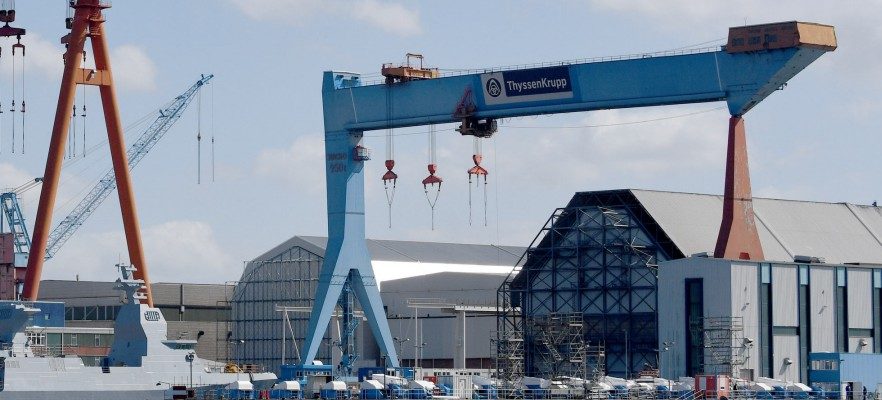According to its own statements, the company is the world market leader for non-nuclear submarines, it employs 6,900 people in northern Germany – and it could soon have new owners: The Essen-based industrial group Thyssen-Krupp wants to separate the armaments division Thyssen-Krupp Marine Systems from the group of companies in order to Find buyers, partners or investors. At a special meeting on Friday, the supervisory board supported these plans by CEO Martina Merz. This emerges from a protocol which the employee representatives on the supervisory board sent to the works councils and which the Süddeutsche Zeitung present.
The division also manufactures warships, the sale could be politically sensitive. But the supervisory board of the M-Dax group does not see any major obstacles here: “We perceive that the federal government supports the formation of a strong national shipbuilding company,” says the report. CEO Merz already said at the Annual General Meeting in February that she was “in dialogue with the federal government to coordinate further action”. The Düsseldorf armaments group Rheinmetall is considered a possible partner. Merz recently dismissed such speculation in one Mirror-Interview: “If you look at what the companies produce, it’s not really obvious.” Interested parties could also include financial investors.
Merz is looking for buyers or investors for several divisions. The group with 96,000 employees is a general store: it is Germany’s largest steel manufacturer, but also works as an automotive supplier, machine builder, commodity trader and, of course, as an operator of military shipyards. Shortly after Merz took up the top post in autumn 2019, she sold the elevator business for 17 billion euros to reduce the company’s debt burden. Merz wants to give up other areas or at least look for partners because the group alone does not have enough money to be able to invest enough in growth everywhere. The manager would like to take a minority stake in the subsidiary Nucera to the stock exchange. The company builds electrolysers, i.e. systems that produce hydrogen with the help of electricity – a future market, because climate-friendly hydrogen is to replace natural gas in industry and power plants in the future.
But because of the Covid crisis and war, the stock market environment has not been right so far. The steel division, for which Merz is also looking for buyers or partners, is progressing just as slowly. It is not the first here: At the turn of the millennium, the then CEO Gerhard Cromme wanted to list the business on the stock exchange, but this did not succeed. Later, mergers with rivals Tata and Liberty Steel failed. In the most recent attempt, financial investors or foreign competitors such as CSN from Brazil are considered interested parties. Merz also brings up the possibility that large hydrogen producers, something from the Arab world, could participate. After all, in a few years, Thyssen-Krupp’s Duisburg steel works will need huge amounts of hydrogen in order to be able to produce steel in a climate-friendly manner and without coke and coal.
The group receives enormous subsidies
It was only in March that the group placed an order for a so-called direct reduction plant, which will replace one of the four blast furnaces and produce iron with the help of hydrogen. The costs are around two billion euros. The state government supports this with 700 million euros, which is the highest subsidy that North Rhine-Westphalia has ever paid. The federal government pays the company more than double that. This should not only cover parts of the construction costs, but also subsidize the operation in the early years. The EU Commission has not yet approved the big checks, but that should happen by the summer.
However, parts of the management and the employee representatives apparently reject the separation from Stahl. On the contrary, they would prefer the steelworks – the origin of the traditional group – to form the center of Thyssen-Krupp in the future and other divisions to be sold instead. In the minutes of the supervisory board meeting, the trade unionists from IG Metall write that they are “still ready to examine a possible independence”. However, it is important for the division to have “sufficient financial resources”. In addition, in view of the high subsidies, “future decisions would have to be coordinated with politicians in the state and in Berlin”.
The trade unionists also harshly criticize CEO Merz because the restructuring of the group is not progressing. “Nothing has changed since last autumn and time has been wasted unnecessarily again. That is unacceptable!” Merz must “finally” present a new overall concept.
No doubt: The top manager could use a success story in the armaments division.

